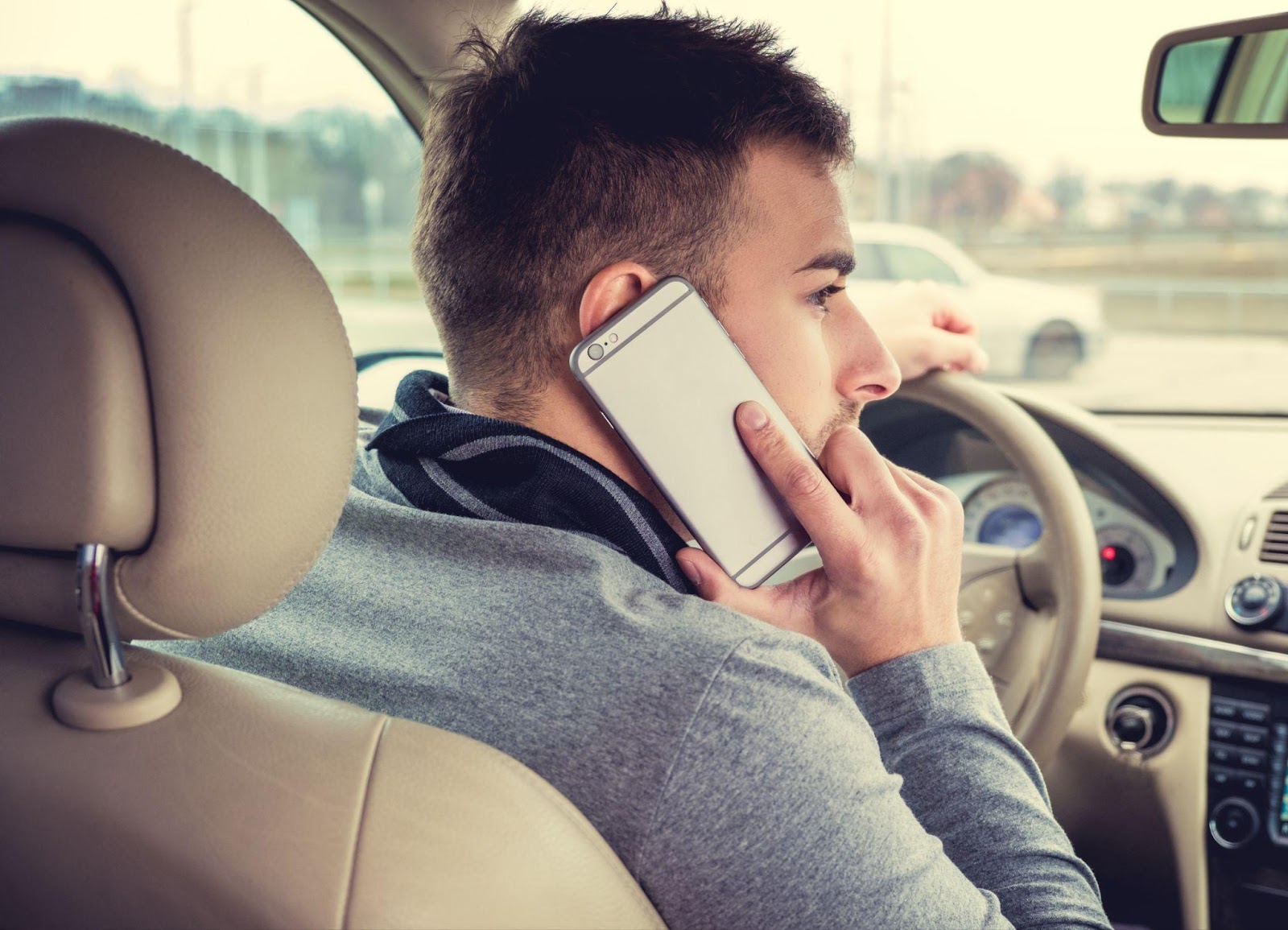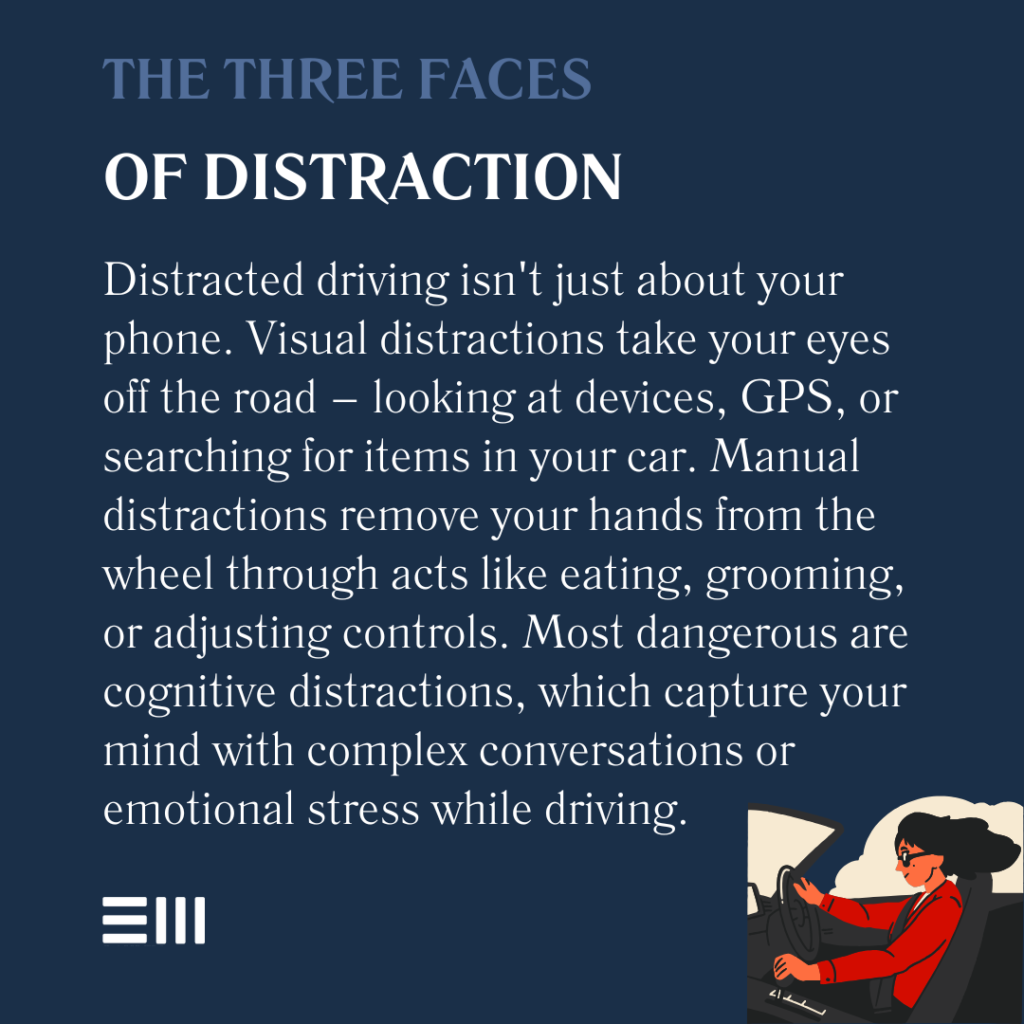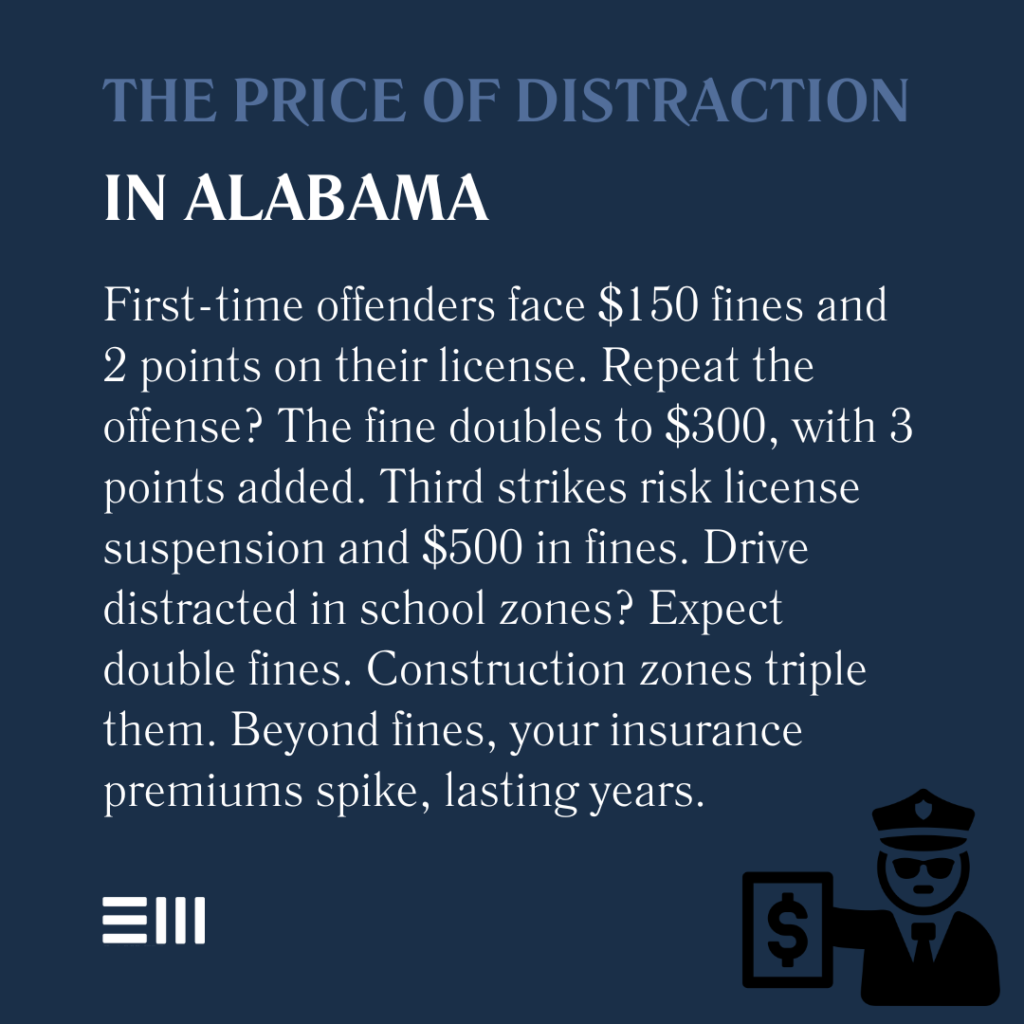
Picture this: You glance down at your phone to read a text message while driving.
In those mere seconds—the length of a typical text—your car travels the distance of a football field while essentially driving blind.
As our lives become increasingly connected through technology, understanding these laws isn’t just about avoiding tickets—it’s about preventing life-changing moments that can happen in the blink of an eye.
How Alabama’s Distracted Driving Laws Protect You
Alabama’s distracted driving laws serve as a comprehensive framework for protecting all road users.
These regulations specifically target behaviors that take a driver’s attention away from the road, with special emphasis on mobile device usage during vehicle operation.
- Complete ban on texting while driving for all drivers;
- Prohibition of handheld cell phone use in school zones;
- Additional restrictions for novice drivers under 18;
- Fines starting at $150 for first-time offenders;
- Points added to driving record for repeat violations;
- Enhanced penalties in construction zones;
- Mandatory court appearances for certain violations; and
- Special provisions for commercial drivers.
These laws aim to create safer roads for everyone, from daily commuters to professional drivers.
Types of Distracted Driving
Understanding different forms of distraction helps drivers recognize and avoid dangerous behaviors. Alabama law enforcement categorizes distracted driving into three main types:
Visual Distractions
- Looking at mobile devices;
- Checking GPS navigation;
- Reading billboards or street signs excessively;
- Watching videos; and
- Looking for items in the vehicle.
These visual distractions pose significant risks as they take your eyes off the road for crucial seconds, during which accidents can occur.
Manual Distractions
- Holding and manipulating phones;
- Eating or drinking;
- Applying makeup or grooming;
- Adjusting radio or climate controls; and
- Reaching for items in the vehicle.
When your hands leave the wheel, your ability to respond to sudden road hazards decreases dramatically, making these manual distractions particularly dangerous.
Cognitive Distractions
- Engaging in complex conversations;
- Daydreaming;
- Planning activities or tasks;
- Focusing on work-related stress; and
- Processing intense emotions.
Even when your eyes are on the road and hands on the wheel, these mental distractions can significantly impair your reaction time and decision-making abilities.

Penalties and Enforcement in Alabama
Before diving into specific penalties, it’s important to understand how Alabama law enforcement identifies and prosecutes distracted driving violations. The state employs various methods to detect and document violations.
Financial Penalties
- First offense: $150 fine and 2 points on driving record;
- Second offense: $300 fine and 3 points on driving record;
- Third offense: $500 fine, possible license suspension;
- Enhanced penalties in school zones (double fines); and
- Construction zone violations (triple fines).
These escalating penalties reflect Alabama’s serious approach to deterring repeat offenses and protecting vulnerable areas.
Administrative Consequences
- License suspension after multiple violations;
- Mandatory defensive driving courses;
- Insurance premium increases;
- Commercial license restrictions; and
- Employment implications for professional drivers.
These administrative penalties can have long-lasting effects on both personal and professional aspects of a driver’s life.
Civil Liability
- Increased responsibility in accident cases;
- Higher insurance deductibles;
- Potential personal injury lawsuits;
- Property damage liability; and
- Long-term financial impact.
Understanding these civil consequences helps drivers recognize the full scope of risk associated with distracted driving behaviors.

Exceptions and Special Circumstances
Alabama’s distracted driving laws include specific provisions for certain situations and professionals.
Understanding these exceptions helps ensure compliance while maintaining necessary communication.
Emergency Situations
- Calls to 911;
- Medical emergencies;
- Reporting criminal activities;
- Responding to natural disasters; and
- Severe weather communications.
These critical exceptions ensure public safety while maintaining the overall integrity of distracted driving laws.
Professional Exemptions
- First responders during official duties;
- Emergency medical personnel;
- Law enforcement officers;
- Fire department personnel; and
- Emergency management officials.
These exemptions allow essential personnel to perform their vital public safety duties effectively.
Technical Allowances
- GPS usage while vehicle is stationary;
- Hands-free device operation;
- Voice-activated commands;
- Mounted device interactions; and
- Parked vehicle operations.
These technical provisions balance modern communication needs with safety requirements, providing practical solutions for necessary device usage.
Rights and Responsibilities
When facing a distracted driving citation in Alabama, you have specific rights and responsibilities that can affect your case outcome.
Legal Rights
- Right to contest the citation;
- Ability to seek legal representation;
- Right to review evidence;
- Access to court records; and
- Appeal options.
These fundamental legal rights ensure you have the opportunity to present your case and defend yourself properly within the judicial system.
Driver Responsibilities
- Responding to citations within 15 days;
- Appearing in court if required;
- Maintaining insurance coverage;
- Completing required courses; and
- Paying fines on time.
Meeting these responsibilities promptly and fully not only helps resolve your case more smoothly but also prevents additional penalties and complications that could arise from non-compliance.
Remember, taking action early and staying proactive throughout the process often leads to better outcomes.
Frequently Asked Questions About Distracted Driving Laws in Alabama
It’s common for Alabama drivers to have questions about how distracted driving laws affect them.
Here are detailed answers to the most common inquiries we receive.
What Counts as Distracted Driving in Alabama?
Distracted driving encompasses any activity that diverts attention from driving, including texting, eating, or adjusting the radio. The law specifically focuses on electronic device usage while operating a vehicle.
How Does Alabama Define Hands-free Device Use?
Hands-free devices must operate through voice commands or single-touch activation and be mounted properly in the vehicle. The device should not obstruct the driver’s view or require extended interaction.
Can I Use My Phone at Red Lights?
While stopped, you may use your phone for GPS purposes, but texting remains prohibited even when the vehicle isn’t moving. The law considers a vehicle at a red light to be “in operation.”
What Evidence Is Needed for a Distracted Driving Citation?
Law enforcement officers must observe direct evidence of distraction or have probable cause based on driving behavior. This can include visual observation of phone use or erratic driving patterns.
How Do Points Affect My Insurance Rates?
Distracted driving violations typically result in insurance premium increases lasting three to five years. The exact impact depends on your insurance provider and driving history.
Take Action for Your Rights Today
Don’t let a distracted driving citation impact your future. Our experienced attorneys understand Alabama’s complex traffic laws and can help protect your rights.
Contact us today for a free consultation and learn how we can help navigate your case toward the best possible outcome.
Can't find what you're looking for? Search our site below.










